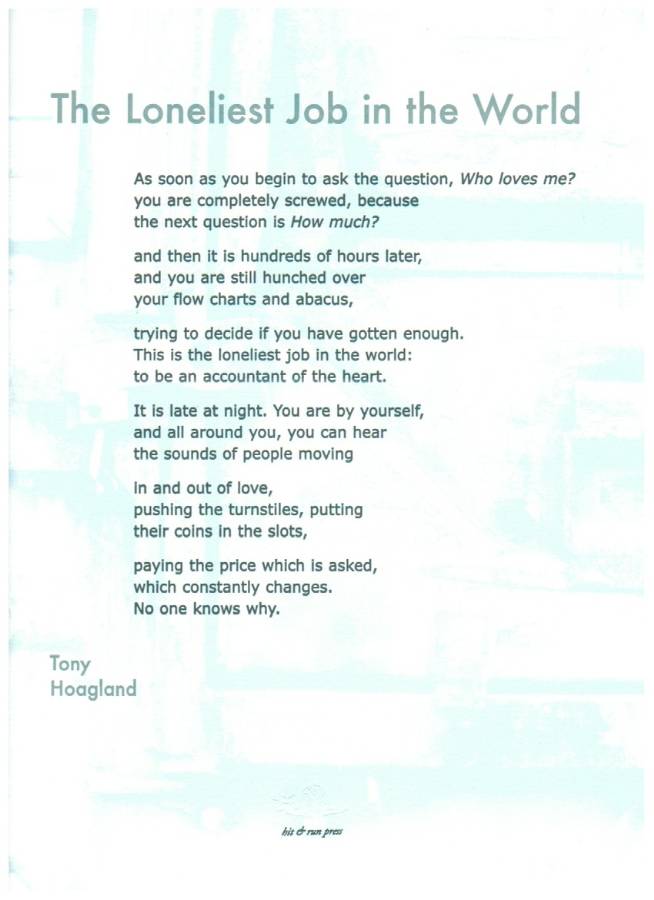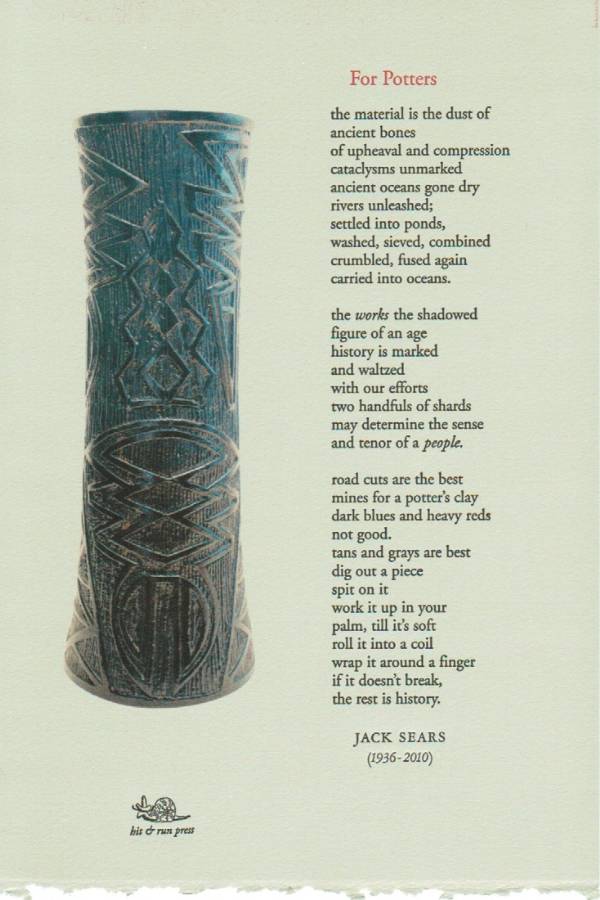Following yesterday’s post about poems that try to make sense of the constant data we swim in, here’s one by Dean Young, from his booking, Fall Higher. The Tony in this poem is the Tony Hoagland from yesterday.
Tag: Tony Hoagland
Awake in America
How can we process the barrage of data in which we live? It’s hard to make sense of the huge events that shape current history, and yet here they are, paraded in front of us replayed at 6, 9, 10, 11 and in-between, mingled with small horrors, trivia, obligation, inspiration–an overwhelming soup, seasoned with complicity and powerlessness.
Tony Hoagland and Dean Young are poets whose work seems to me to address this in particular. So I thought I’d post a few poems over the next few days–one by each of them, a few by others. Let me know what you think.
America
Then one of the students with blue hair and a tongue stud
Says America is for him a maximum security prison whose walls
Are made of Radio Shacks and Burger Kings, and MTV episodes
Where you can’t tell the show from the commercials;
Polenta Pizza & Some Highlights from the Salon
 Here is the Polenta Pizza recipe from the Salon, as promised:
Here is the Polenta Pizza recipe from the Salon, as promised:
Polenta Pizza
1½ C Polenta
6 C stock
¼ tsp red pepper flakes
¼ C butter
salt to taste
Roasted vegetables
Heat the stock to boiling and gradually stir in the polenta. Add red pepper flakes and a little salt. Simmer and stir occasionally until thick (about 20 minutes). Add the butter and stir. Check for salt and add if necessary. Spread on two or three large, lightly oiled cookie sheets with rims and bake at 425 until set, about 8 minutes. Crust should be about ¼” thick.
Slice vegetables and toss with olive oil and whatever herbs you like. I roast about 30 minutes at 425, turning once as they tend to brown on the bottom first. Roasted red and yellow peppers, cauliflower, parsnips, carrots, anything goes on the pizzas. I like lots of onions, and I usually just slice these thin and sauté them in olive oil on the top of the stove, then let them dry on paper towels. It’s good to have heaps of vegetables. If in season, figs make a nice addition. I slice them and roast them with a little butter and ginger—use tinfoil on your pan for these, easier to clean. If you want meat, you can add fried pepperoni or sausage. If you want cheese, you can crumble a little feta or grated parmesan.
You can make the crust and/or roast the vegetables beforehand and assemble on the crust just before serving. Then just warm for a few minutes in a hot oven. Also good cold.
Also a few highlights from the salon:
Larry showed two broadsides he did recently with Lisa of Littoral Press, one of a Tony Hoagland poem (scanner bed a little too narrow to do it justice), and one of a poem by a friend and master potter, Jack Sears, who died just about a year ago:
And here is Jackie’s original composition, Dark Flight, on the violin, though she played a piano version for us.
Monday, Monday
A friend spent the night last night, and added to our breakfast conversation by reading aloud from the Monday Metropolitan Diary section of the New York Times:
“Practice, practice, practice may be the way to Carnegie Hall, but is it worth it if no one remembers your name, much less the hall itself?
Recently overheard from a couple settling into their seats behind me before a concert: “This is where we heard that guy play the piano, isn’t it?”
That’s the problem with fame in a nutshell!
Then Larry said that there was a place called The Royal Roost in New York where Charlie Parker, Dizzy, Miles, Kenny Durham and other jazz greats used to play that was nicknamed The Metropolitan Bopera House.
Then I got to the work of the morning. Every Monday I send a poem to a little group of poets who trade poems each week. We’ve been doing this almost 10 years now! We each have a day. Sometimes we send our poems, but most often a poem we’ve encountered that we like a lot. Today I sent out a poem by Tony Hoagland, one of my favorite poets.
 I love the way he mixes humor and the overpowering emotions we each feel, how he takes a situation everyone can recognize—the desire to seduce someone—and elevates it. Then he brings us back to earth, reminding us that we live here, amid the base, confusing and overpowering passions, no matter how much we love literature.
I love the way he mixes humor and the overpowering emotions we each feel, how he takes a situation everyone can recognize—the desire to seduce someone—and elevates it. Then he brings us back to earth, reminding us that we live here, amid the base, confusing and overpowering passions, no matter how much we love literature.
The Collaboration
That was the summer I used The Duino Elegies
in all of my seductions,
taking Rilke from my briefcase
the way another man might break out
candlelight and wine.
I think Rilke would have understood,
would have thought the means
justified the end, as I began to read
in a voice so low it forced my audience
to lean a little closer,
as if Rilke were a limestone bench
stationed on a hillside
where lovers gathered to enjoy the vista
of each other listening.
What a chaperone,
and what a view—is it Susan
I am thinking of?—
how, in the middle of the great Ninth Elegy,
in the passage where the poet
promises to memorize the earth,
her tanned and naked knee
seemed the perfect landing platform
for any angels in the vicinity.
I think Rilke would have seen
the outline of an angel
in the space between our bodies
just before we kissed,
then seen it vanish
as we clashed together
and commenced our collaboration
on another chapter
of the famous, familiar and amusing
saga of human relations—choosing
heat instead of grace,
possession over possibility—trading
the kingdom of heaven
one more time
for two arms full
of beautiful, confusing earth.
This poem is from Sweet Ruin, like all of Tony’s books, worth owning! For those interested in poetics, his book of essays, Real Sofistikashun, is a treat.
Poems by heart
One year at the Squaw Valley Poetry Workshop, Bob Hass gave a craft talk in which he said he had memorized his own poetry by driving around with a cassette of his poems. I’d been memorizing poems for a long time used this technique to memorize several dozen poems more (not my own, though). As a result, not only do I have a treasury of poems to get me through long lines and bad traffic, snippets of poems come to me just in the course of an ordinary day.
Walking down the street in spring,  when the new leaves have just unfurled, I sometimes think of Tony Hoagland’s poem, A Color of the Sky, in which he calls the color of these leaves “the very tint of inexperience.”
when the new leaves have just unfurled, I sometimes think of Tony Hoagland’s poem, A Color of the Sky, in which he calls the color of these leaves “the very tint of inexperience.”
As I come out of the tunnel on Highway 24 and see San Francisco gleaming white over the bay, I might think of Wordsworth’s lines:
“The city now doth like a garment wear
The beauty of the morning, silent, bare.
Ships, domes, theatres and temples lie
Open to the fields, and to the sky;
All bright and glittering in the smokeless air.”
And when my granddaughter complains of boredom, I think of Berryman’s wonderful dream song that begins:
“Life, friends, is boring. We must not say so.
After all, the sky flashes, the great sea yearns,
we ourselves flash and yearn,
and moreover, my mother told me as a boy
(repeatingly), “Ever to confess you’re bored
means you have no
Inner Resources.”
I refrain from quoting it to her, but it makes me smile.
Having an internal library of poems I love enriches my day, and will be a comfort if they every put me (like Christopher Smart) in solitary confinement. Here’s a poem about this:
Poems by Heart
The first I memorized was for Miss Underhill
in seventh grade: Frost’s woods.
Then Márgaret’s melodious grief,
like nothing I’d heard before,
like the anthem of my tribe.
I grabbed onto poetry as if
it were the round, white circle
of canvas-covered cork
thrown from the lifeguard’s chair
when they hauled me out,
and stood me on my feet,
still flailing.
The poems meant that somewhere
there had to be others like me.
They had left me a trail of words,
little candy lifesavers in rainbow colors,
and I ate them, one by one,
as I made my way
across the acres of suburban
athletic fields and sidewalks
to find them.

